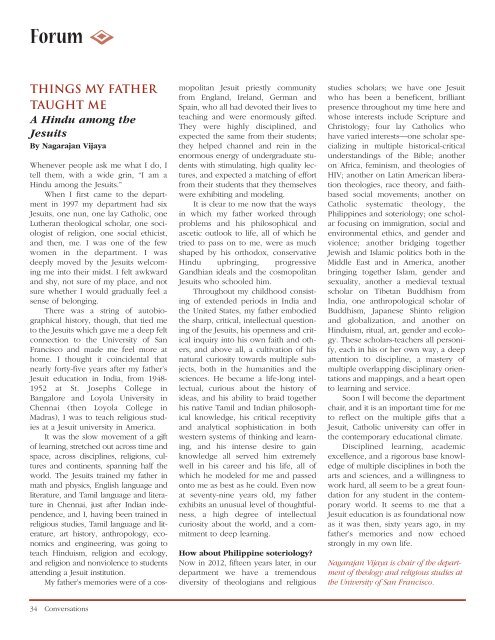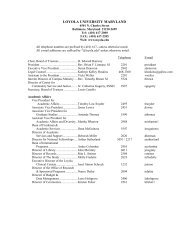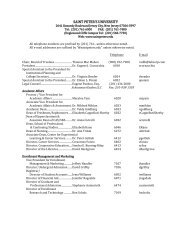to download it today - Association of Jesuit Colleges and Universities
to download it today - Association of Jesuit Colleges and Universities
to download it today - Association of Jesuit Colleges and Universities
You also want an ePaper? Increase the reach of your titles
YUMPU automatically turns print PDFs into web optimized ePapers that Google loves.
Forum<br />
THINGS MY FATHER<br />
TAUGHT ME<br />
A Hindu among the<br />
Jesu<strong>it</strong>s<br />
By Nagarajan Vijaya<br />
Whenever people ask me what I do, I<br />
tell them, w<strong>it</strong>h a wide grin, “I am a<br />
Hindu among the Jesu<strong>it</strong>s.”<br />
When I first came <strong>to</strong> the department<br />
in 1997 my department had six<br />
Jesu<strong>it</strong>s, one nun, one lay Catholic, one<br />
Lutheran theological scholar, one sociologist<br />
<strong>of</strong> religion, one social ethicist,<br />
<strong>and</strong> then, me. I was one <strong>of</strong> the few<br />
women in the department. I was<br />
deeply moved by the Jesu<strong>it</strong>s welcoming<br />
me in<strong>to</strong> their midst. I felt awkward<br />
<strong>and</strong> shy, not sure <strong>of</strong> my place, <strong>and</strong> not<br />
sure whether I would gradually feel a<br />
sense <strong>of</strong> belonging.<br />
There was a string <strong>of</strong> au<strong>to</strong>biographical<br />
his<strong>to</strong>ry, though, that tied me<br />
<strong>to</strong> the Jesu<strong>it</strong>s which gave me a deep felt<br />
connection <strong>to</strong> the Univers<strong>it</strong>y <strong>of</strong> San<br />
Francisco <strong>and</strong> made me feel more at<br />
home. I thought <strong>it</strong> coincidental that<br />
nearly forty-five years after my father’s<br />
Jesu<strong>it</strong> education in India, from 1948-<br />
1952 at St. Josephs College in<br />
Bangalore <strong>and</strong> Loyola Univers<strong>it</strong>y in<br />
Chennai (then Loyola College in<br />
Madras), I was <strong>to</strong> teach religious studies<br />
at a Jesu<strong>it</strong> univers<strong>it</strong>y in America.<br />
It was the slow movement <strong>of</strong> a gift<br />
<strong>of</strong> learning, stretched out across time <strong>and</strong><br />
space, across disciplines, religions, cultures<br />
<strong>and</strong> continents, spanning half the<br />
world. The Jesu<strong>it</strong>s trained my father in<br />
math <strong>and</strong> physics, English language <strong>and</strong><br />
l<strong>it</strong>erature, <strong>and</strong> Tamil language <strong>and</strong> l<strong>it</strong>erature<br />
in Chennai, just after Indian independence,<br />
<strong>and</strong> I, having been trained in<br />
religious studies, Tamil language <strong>and</strong> l<strong>it</strong>erature,<br />
art his<strong>to</strong>ry, anthropology, economics<br />
<strong>and</strong> engineering, was going <strong>to</strong><br />
teach Hinduism, religion <strong>and</strong> ecology,<br />
<strong>and</strong> religion <strong>and</strong> nonviolence <strong>to</strong> students<br />
attending a Jesu<strong>it</strong> inst<strong>it</strong>ution.<br />
My father’s memories were <strong>of</strong> a cos-<br />
34 Conversations<br />
mopol<strong>it</strong>an Jesu<strong>it</strong> priestly commun<strong>it</strong>y<br />
from Engl<strong>and</strong>, Irel<strong>and</strong>, German <strong>and</strong><br />
Spain, who all had devoted their lives <strong>to</strong><br />
teaching <strong>and</strong> were enormously gifted.<br />
They were highly disciplined, <strong>and</strong><br />
expected the same from their students;<br />
they helped channel <strong>and</strong> rein in the<br />
enormous energy <strong>of</strong> undergraduate students<br />
w<strong>it</strong>h stimulating, high qual<strong>it</strong>y lectures,<br />
<strong>and</strong> expected a matching <strong>of</strong> effort<br />
from their students that they themselves<br />
were exhib<strong>it</strong>ing <strong>and</strong> modeling.<br />
It is clear <strong>to</strong> me now that the ways<br />
in which my father worked through<br />
problems <strong>and</strong> his philosophical <strong>and</strong><br />
ascetic outlook <strong>to</strong> life, all <strong>of</strong> which he<br />
tried <strong>to</strong> pass on <strong>to</strong> me, were as much<br />
shaped by his orthodox, conservative<br />
Hindu upbringing, progressive<br />
G<strong>and</strong>hian ideals <strong>and</strong> the cosmopol<strong>it</strong>an<br />
Jesu<strong>it</strong>s who schooled him.<br />
Throughout my childhood consisting<br />
<strong>of</strong> extended periods in India <strong>and</strong><br />
the Un<strong>it</strong>ed States, my father embodied<br />
the sharp, cr<strong>it</strong>ical, intellectual questioning<br />
<strong>of</strong> the Jesu<strong>it</strong>s, his openness <strong>and</strong> cr<strong>it</strong>ical<br />
inquiry in<strong>to</strong> his own fa<strong>it</strong>h <strong>and</strong> others,<br />
<strong>and</strong> above all, a cultivation <strong>of</strong> his<br />
natural curios<strong>it</strong>y <strong>to</strong>wards multiple subjects,<br />
both in the human<strong>it</strong>ies <strong>and</strong> the<br />
sciences. He became a life-long intellectual,<br />
curious about the his<strong>to</strong>ry <strong>of</strong><br />
ideas, <strong>and</strong> his abil<strong>it</strong>y <strong>to</strong> braid <strong>to</strong>gether<br />
his native Tamil <strong>and</strong> Indian philosophical<br />
knowledge, his cr<strong>it</strong>ical receptiv<strong>it</strong>y<br />
<strong>and</strong> analytical sophistication in both<br />
western systems <strong>of</strong> thinking <strong>and</strong> learning,<br />
<strong>and</strong> his intense desire <strong>to</strong> gain<br />
knowledge all served him extremely<br />
well in his career <strong>and</strong> his life, all <strong>of</strong><br />
which he modeled for me <strong>and</strong> passed<br />
on<strong>to</strong> me as best as he could. Even now<br />
at seventy-nine years old, my father<br />
exhib<strong>it</strong>s an unusual level <strong>of</strong> thoughtfulness,<br />
a high degree <strong>of</strong> intellectual<br />
curios<strong>it</strong>y about the world, <strong>and</strong> a comm<strong>it</strong>ment<br />
<strong>to</strong> deep learning.<br />
How about Philippine soteriology?<br />
Now in 2012, fifteen years later, in our<br />
department we have a tremendous<br />
divers<strong>it</strong>y <strong>of</strong> theologians <strong>and</strong> religious<br />
studies scholars; we have one Jesu<strong>it</strong><br />
who has been a beneficent, brilliant<br />
presence throughout my time here <strong>and</strong><br />
whose interests include Scripture <strong>and</strong><br />
Chris<strong>to</strong>logy; four lay Catholics who<br />
have varied interests—one scholar specializing<br />
in multiple his<strong>to</strong>rical-cr<strong>it</strong>ical<br />
underst<strong>and</strong>ings <strong>of</strong> the Bible; another<br />
on Africa, feminism, <strong>and</strong> theologies <strong>of</strong><br />
HIV; another on Latin American liberation<br />
theologies, race theory, <strong>and</strong> fa<strong>it</strong>hbased<br />
social movements; another on<br />
Catholic systematic theology, the<br />
Philippines <strong>and</strong> soteriology; one scholar<br />
focusing on immigration, social <strong>and</strong><br />
environmental ethics, <strong>and</strong> gender <strong>and</strong><br />
violence; another bridging <strong>to</strong>gether<br />
Jewish <strong>and</strong> Islamic pol<strong>it</strong>ics both in the<br />
Middle East <strong>and</strong> in America, another<br />
bringing <strong>to</strong>gether Islam, gender <strong>and</strong><br />
sexual<strong>it</strong>y, another a medieval textual<br />
scholar on Tibetan Buddhism from<br />
India, one anthropological scholar <strong>of</strong><br />
Buddhism, Japanese Shin<strong>to</strong> religion<br />
<strong>and</strong> globalization, <strong>and</strong> another on<br />
Hinduism, r<strong>it</strong>ual, art, gender <strong>and</strong> ecology.<br />
These scholars-teachers all personify,<br />
each in his or her own way, a deep<br />
attention <strong>to</strong> discipline, a mastery <strong>of</strong><br />
multiple overlapping disciplinary orientations<br />
<strong>and</strong> mappings, <strong>and</strong> a heart open<br />
<strong>to</strong> learning <strong>and</strong> service.<br />
Soon I will become the department<br />
chair, <strong>and</strong> <strong>it</strong> is an important time for me<br />
<strong>to</strong> reflect on the multiple gifts that a<br />
Jesu<strong>it</strong>, Catholic univers<strong>it</strong>y can <strong>of</strong>fer in<br />
the contemporary educational climate.<br />
Disciplined learning, academic<br />
excellence, <strong>and</strong> a rigorous base knowledge<br />
<strong>of</strong> multiple disciplines in both the<br />
arts <strong>and</strong> sciences, <strong>and</strong> a willingness <strong>to</strong><br />
work hard, all seem <strong>to</strong> be a great foundation<br />
for any student in the contemporary<br />
world. It seems <strong>to</strong> me that a<br />
Jesu<strong>it</strong> education is as foundational now<br />
as <strong>it</strong> was then, sixty years ago, in my<br />
father’s memories <strong>and</strong> now echoed<br />
strongly in my own life.<br />
Nagarajan Vijaya is chair <strong>of</strong> the department<br />
<strong>of</strong> theology <strong>and</strong> religious studies at<br />
the Univers<strong>it</strong>y <strong>of</strong> San Francisco.




